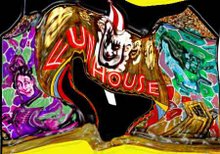"End of the Rainbow" at the Guthrie (Short Review)
If you have the chance, head over to the Guthrie theater and see Tracie Bennett channeling the (almost always) late, but amazing Judy Garland. Terry Johnson does a tremendous job of directing the story of Mrs. Judy (Frances Gumm) Garland Rose Minelli Luft Herrons Deans as she reaches the end of her life. The show is a musical tour de force when it comes to embodying the manic and explosive dancing and singing of la Belle Dame Americaine sans Merci. While Bennett does not have the facial structure of Mrs. Norman Maine, (above all she lacks Garland's big eyes), everything else is perfect! Ms. Bennett has the absolutely right size and body build for the role and she produces the energy, mannerisms and bombast to a T.
Are there other reasons to see the production? You betcha! The supporting cast is fantastic! Michael Cumpsty dazzles as Anthony, Ms. Garland's gay piano player with a heart of gold and the desire to protect and care for the unraveling fragile star.
He is balanced by Tom Pelphrey playing a far too attractive and likeable Mickey Deans, the kind of younger guy that we can believe that a cougar of a broad would love to sink her teeth into.

The costuming is also very tasty, with Pelphrey in period-perfect bell bottoms and long hair and Bennett in a beaded pant suit that is nearly identical to one worn by Garland near her life's end.


Even the sets are yummy, moving seamlessly from French Provincial gilt hotel furnishings to "The Talk of the Town" club set and back almost without audience notice.
The weakest aspect of the production is the play itself, which while thoroughly entertaining, lacks complexity of structure and doesn't really give the secondary characters enough material. This is easy to understand given the magnitude of the primary character and her downward slide into poverty and drugs. We feel the pain not only of the has-been star, but also of those who care about her and thus want to both protect her, help her succeed and see her rise victorious over substance addiction.The pain is emotional and physical, like Garland herself and thus not nuanced. Alas, it was not to be, but I really think the interesting aspect of the story is not a star going super-nova, but rather the ethical negotiations and the navigation of self-delusions of those that live with an addict. While the play touches on this theme, it reserves far too little time for the animosity between Ms. Garland's possibly exploitative last husband-to-be and her sensitive and over-protective piano player.

Garland bemoans that she doesn't want to be the oldest remaining vaudevillean, so perhaps that means it is okay to leave merely a hint of the difficult decisions that lie beneath the surface. We get tremendous entertainment value from the "End of the Rainbow" and if the ethical dilemmas are hinted at but not fully explored then, the play has at the very least followed that old mantra of vaudeville, "Leave them wanting more."



No comments:
Post a Comment